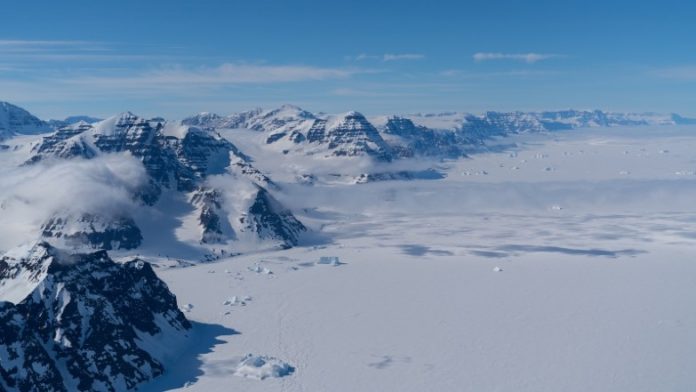The name of the actor Angunnguaq Larsen may not be well-known outside Greenland, but his face is familiar to television audiences in the five Nordic countries and will soon be seen in many European countries. He plays a police chief with a Clint Eastwood-esque calm and charisma in Thin Ice, is a new Swedish-Icelandic “Nordic noir” series coproduced by Yellow Bird and Saga film, where geo-political twists and turns and thrilling mayhem plays out against the backdrop of beautiful Greenlandic scenery.
Angunnguaq Larsen has a ready smile and at this moment he has good reason to. Not only has he had his greatest success as an actor but his country Greenland has just been declared Covid-free and is opening up to business.
Larsen is, of course, happy to see restrictions lifted and social life returning to normal little by little, but the 44 year-old sound technician, musician and actor also looks back with warmth at the weeks he has passed with this family, wife and three daughters in confinement.
Closer as a family
“I think this has been good for a lot of people. We had been living in a high-tempo until everything was closed down. We have spent most of the time at home and this has brought us closer to each-other as a family.”
While the UN Permanent Forum for Indigenous Issues has called for information on COVID-19 to be available in local languages, Greenland has had no such worries, since Greenlandic is an official language and the island enjoys self-rule within the Kingdom of Denmark.
When Angu, as he is often called, ironically points out that the Danish press had “breaking news” about the ban on the sale of alcohol but hardly reported the news of zero-infections in Greenland, he highlights the image of his country in Denmark – Greenland´s masters since the early 18th century.
The debate in Denmark about Greenland focused on financial hand outs and social problems until the world´s super powers started showing interest in the Arctic in the past few years.
Greenland has a population of barely 60,000 but there is enough space for everybody. The world´s biggest island is 2.2 million square kilometers which amounts to virtually all of Western Europe; France, Germany, Great Britain, Italy and Spain combined.

New reality
Although ice covers most of Greenland´s surface, the ice-free area is easily as big as Sweden or Norway and Iceland combined. The melting of both the Greenland ice-cap and the anticipation of a soon-to-be ice-free in the summer Arctic has created a new geopolitical reality.
For viewers of the Thin Ice series it will come as no surprise that the super-powers are in a tug-of-war over Greenland with Denmark.
“Life imitating art, that is well said,” Angu agrees and no wonder since the very same day that Greenland marked three weeks of no infections and subsequent deconfinement, the United States announced an unsolicited $12 million-dollar economic aid package to Greenland.
Earlier, and before the shooting of the Thin ice series, US President Donald Trump actually proposed to buy Greenland, which was turned down by Danish authorities.
Greenlanders themselves were not consulted but Angu is skeptical about America´s sudden interest. “Everyone here asks themselves why we should receive money from the US. No one believes that there are no strings attached.“

Climate change and oil
In the series Angunnguaq Larsen is the local police chief of a small Greenlandic town that hosts an Arctic Council meeting where Foreign Ministers of Denmark representing Greenland, the US, Russia, Canada, Norway, Sweden, Finland and Iceland are supposed to sign a treaty banning new drilling for oil in the Arctic.
The twist is that unbeknownst to most of the delegates a huge reservoir of oil has been discovered in Greenlandic waters and the protagonists use violence to prevent the signing of the treaty. The viewer is kept guessing who the bad guys are; Americans, Russians, Swedes or Danes.
As glaciers retreat due to climate change, some of Greenland´s natural resources may be easier to harness. Rare earths, diamonds, gold and copper are believed to be in vast quantities beneath the soil in Greenland but due to high-costs and lack of infrastructure little has yet materialised. Greenland is currently dependent on hand-outs from Denmark, but it has aspirations to become independent once it can stand on its own feet.
The problem posed in the Thin Ice is what happens if oil were to be discovered in Greenland in such large quantities that it would not only pave the way for Greenlandic independence but would also jeopardise the Paris Climate Change Agreement as abundant oil would flow into the market and undermine efforts to cut CO2 emissions.
It is widely believed that up to 13% of the undiscovered oil and 30% of the undiscovered natural gas are to be found in the Arctic, but attempts to find oil in Greenlandic waters have not yet been successful. Digging for oil in the high-north is controversial, not least after the oil spill in the Gulf of Mexico in 2010.

Sustainable tourism
China´s interest in the Arctic has provoked reactions both in Washington and Brussels as well as the Nordic capitals. Chinese companies have recently showed interest in participating in the building of new airports in Nuuk and the tourist paradise Ilulissat.
But hopes of increasing tourism by improving the infra-structure may be put on hold by COVID-19. Greenland has not reopened its borders and no one dares to predict the future of world tourism for the time being.
Additional links:

